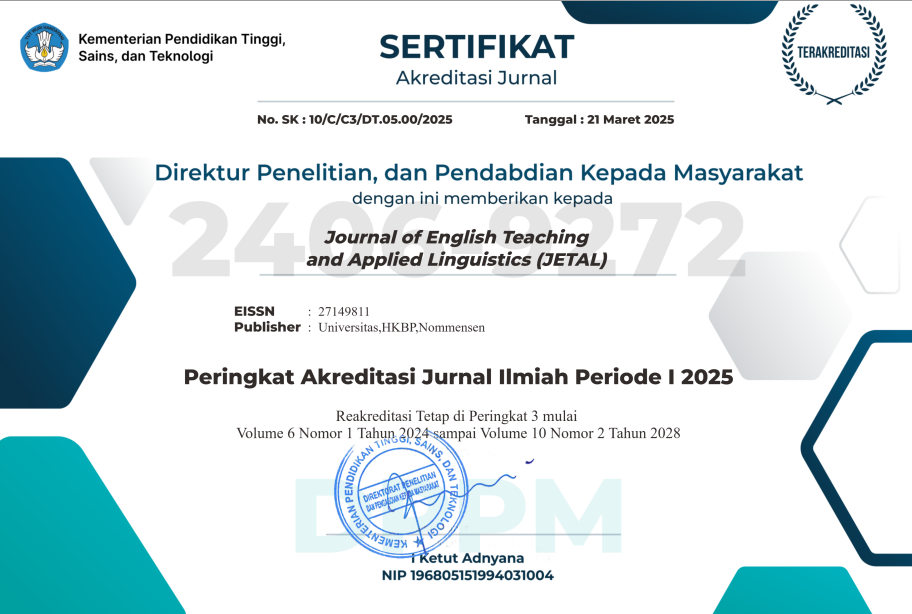Utilizing Generative AI to Enhance EFL Learners’ Learning Motivation: A Case Study
Abstract
Artificial intelligence (AI) has become a topic that increasingly received close review in recent years, and its impact is becoming more obvious in a variety of disciplines, including education. This study examines the integration of generative AI in Business English Class to enhance EFL learners’ motivation. A sequential explanatory mixed-methods research design was employed, involving both quantitative and qualitative data collection methods. The quantitative data were analyzed by using descriptive statistics and paired t-test. Meanwhile, the qualitative data were analyzed by using thematic analysis. Twenty-three Indonesian students who were enrolled in Business English course were involved in gathering data that were collected through questionnaires and interviews. During the eight-week experimental periods, the students engaged with the generative AI frequently. The findings of descriptive statistical tests revealed that there was a change in student motivation before and after being taught with AI. This difference indicates an increase in student interest after being taught with AI. Furthermore, the paired t-test findings suggested that the increase was classified as significant. From the interviews, it was found that EFL learners experienced a significant increase in their learning motivation derived from the autonomous and controlled motivation, particularly the contingent self-esteem. The generative AI can also be a valuable tool for enhancing EFL learners’ learning motivation by providing personalized feedback, fostering a sense of autonomy, creating a more interactive and engaging learning environment and resolving psychological barriers. Further research should explore how this technology can be scaled to broader educational settings and examine its long-term impact on learner’s motivation and language acquisition. Hence, it helps educators develop best practices for integrating AI tools effectively into the curriculum.
References
Akhmad, N. W. & Munawir A. (2022). Improving the Students’ Pronunciation Ability by Using Elsa Speak App. Journal of Language Teaching and Learning, Linguistics and Literature. 10(1)
Al-Seghayer, K. (2021). Characteristics of Saudi EFL Learners’ Learning Styles . Canadian Center of Science and Education. 14(7). https://doi.org/10.5539/elt.v14n7p82
Alizadeh, M. (2016). The Impact of Motivation on English Language Learning. International Journal of Research in English Education. 1(1).
Beryl, E. (2005) Learner Characteristics of ‘Asian’ EFL Students: Exceptions to the ‘Norm’. In Young, Janelle, Eds. Proceedings Pleasure Passion Provocation. Joint National Conference AATE & ALEA 2005, pages 1-16, Gold Coast, Australia.
Braun, V., & Clarke, V. (2006). Using thematic analysis in psychology. Qualitative Research in Psychology, 3(2), p.77-101.
Cahyono, D. D., Hamda, M. K., & Prahastiwi, E. D. (2022). Pemikiran Abrahma Maslow Tentang Motivasi Dalam Belajar. Tajdid: Jurnal Pemikiran Keislaman Dan Kemanusiaan. 6(1): 37–48.
Chan, C.K.Y., Lee, K.K.W. (2023). The AI generation gap: Are Gen Z students more interested in adopting generative AI such as ChatGPT in teaching and learning than their Gen X and millennial generation teachers?. Smart Learn. Environ. 10, 60. https://doi.org/10.1186/s40561-023-00269-3
Chiu, T. K. F., Moorhouse, B., Chai, C., & Ismailov, M. (2023). Teacher support and student motivation to learn with Artificial Intelligence (AI) based chatbot. Interactive Learning Environments. DOI - 10.1080/10494820.2023.2172044
Creswell , J. (2012). Educational research: Planning, conducting, and evaluating quantitative and qualitative research (4thed.). Upper Saddle River, NJ: Pearson Education.
Creswell, J.W., & Creswell, J.D. (2018). Mixed methods procedures. In, Research design: Qualitative, quantitative, and mixed methods approaches (5th ed., pp. 213-246). Los Angeles, CA: SAGE Publications, Inc.
Decy, E. L. & Ryan, R. M. (2008). Self-Determination Theory: A Macrotheory of Human Motivation, Development, and Health. Canadian Psychological Association. DOI: 10.1037/a0012801
Feuerriegel, S., Hartmann, J., Janiesch, C. & Zschech, P. (2023). Generative AI. Bus Inf Syst Eng. https://doi.org/10.1007/s12599-023-00834-7
Filgona, J., Sakiyo, J., Gwany, D. M., Okoronka, A. U. (2020). Motivation in Learning. Asian Journal of Education and Social Studies. 10(4). 16-37. DOI: 10.9734/ajess/2020/v10i430273
Huang, A. Y. Q., Lu, O. H. T., Yang, S. J. H. (2023). Effects of artificial Intelligence–Enabled personalized recommendations on learners’ learning engagement, motivation, and outcomes in a flipped classroom, Computers & Education, Volume 194, 104684, ISSN 0360-1315, https://doi.org/10.1016/j.compedu.2022.104684.
Jaya, H., Sabran, I. M. M., Djawat, Y. A., Ilham, Ahmar, A. S. (2018). Kecerdasan Buatan. Fakultas MIPA Universitas Negeri Makassar: ISBN 978-602-99837-9-1
Karim, S. A., Hamzah, A.Q. S., Anjani, N. M., Prianti, J. & Sihole, I. G. (2023). Promoting EFL Students’ Speaking Performance Through Elsa Speak: An Artificial Intelligence In English Language Learning. JOLLT Journal of Languages and Language Teaching; 11(4):655-668. DOI: https://doi.org/10.33394/jollt.v%vi%i.8958.
Kelly, S. (2010) Qualitative interviewing techniques and styles. In: Bourgeault I, Dingwall R, de Vries R. (eds) The Sage Handbook of Qualitative Methods in Health Research, Thousand Oaks: Sage Publications.
Kinicki, A., Soignet, D.B. (2022). Management: A Practical Introduction, 10th ed.; McGraw Hill: New York, NY, USA.
Labadze, L., Grigolia, M. & Machaidze, L. (2023). Role of AI chatbots in education: systematic literature review. Int J Educ Technol High Educ 20, 56 https://doi.org/10.1186/s41239-023-00426-1
Lăpădat, L., & Lapadat, M. M. (2024). The Importance of Motivation in Foreign Language Learning. Scientific Bulletin of the Politehnica University of Timişoara Transactions on Modern Languages. DOI - 10.59168/VGLE2734
Marfuatun, M. (2020). Urgensi Teori Hierarki Kebutuhan Maslow Dalam Mengatasi Prokrastinasi Akademik Di Kalangan Mahasiswa. Jurnal Ilmu Kependidikan. 15(2). DOI: 10.29408/edc.v15i2.2714
Moybeka, A., Syariatin, N., Tatipang, D., Mushthoza, D. A., Dewi, N. P. J. L., & Tineh, S. (2023). Artificial Intelligence and English Classroom: The Implications of AI Toward EFL Students’ Motivation. Edumaspul: Jurnal Pendidikan, 7(2), 2444-2454. https://doi.org/10.33487/edumaspul.v7i2.6669
Neji, W., Boughattas, N., & Ziadi, F. (2023). Exploring New AI-Based Technologies to Enhance Students’ Motivation. Issues in Informing Science and Information Technology DOI 10.28945/5149
Neo, M., Lee, C.P., Ju-Tan, H. Y., Neo, T. K., tan, Y. X., Mahendru, N., Ismat, Z. (2022). Enhancing Students’ Online Learning Experiences with Artificial Intelligence (AI): The MERLIN Project. International Journal of Technology. doi: 10.14716/ijtech.v13i5.5843
Puspitarini, Y.D. & Hanif, M. (2019). Using Learning Media to Increase Learning Motivation in Elementary School. Anatolian Journal of Education. ERIC Number: EJ1244451. ISSN: EISSN-2547-9652
Rao, P. S. (2019). The Importance of Speaking Skills In English Classrooms. Alford Council of International English & Literature Journal(ACIELJ). 2(2).
Saleh, Z. (2019). Artificial Intelligence Definition, Ethics and Standards. The british University in Egypt.
Salido, V. (2023). Impact of AI-Powered Learning Tools on Student Understanding and Academic Performance. DOI:10.13140/RG.2.2.17259.31521
Sidik, Z. & Sobandi, A. (2018). Upaya Meningkatkan Motivasi Belajar Siswa Melalui Kemampuan Komunikasi Interpersonal Guru. Jurnal Pendidikan Manajemen Perkantoran. 3(2): 193. https://doi.org/10.17509/jpm.v3i2.11764
Silitonga, L.M. Hawanti, S., Wu, T. (2023). The Impact of AI Chatbot-Based Learning on Students’ Motivation in English Writing Classroom. Springer, Cham. https://doi.org/10.1007/978-3-031-40113-8_53
Sugiyono. (2017). Metode Penelitian Kuantitatif, Kualitatif, dan R&D. Bandung :Alfabeta, CV.
Susanti, D., Sari, L. Y. ., & Fitriani, V. (2022). Increasing Student Learning Motivation through the Use of Interactive Digital Books Based on Project Based Learning (PjBL). Jurnal Penelitian Pendidikan IPA, 8(4), 1730–1735. https://doi.org/10.29303/jppipa.v8i4.1669
Szymkowiak, A., Melović, B., Dabić, M., Jeganathan, K. & Kundi, G.S. (2021). Information technology and Gen Z: The role of teachers, the internet, and technology in the education of young people, Technology in Society, Volume 65, 101565, ISSN 0160-791X, https://doi.org/10.1016/j.techsoc.2021.101565.
Wardani, A. D., Gunawan, I., Kusumaningrum, D.E., Benty, D. D. N., Sumarsono, R. B., Nurabadi, A. & Lestari Handayani. (2020). Student Learning Motivation: A Conceptual Paper. Proceedings of the 2nd Early Childhood and Primary Childhood Education. doi.org/10.2991/assehr.k.201112.049
Yalçın-İncik, E., & İncik, T. (2022). Generation Z students’ views on technology in education: What they want what they get. Malaysian Online Journal of Educational Technology, 10(2), 109-124. http://dx.doi.org/10.52380/mojet.2022.10.2.275
Yuliana, A. (2018). Teori Abraham Maslow dalam Pengambilan Kebijakan di Perpustakaan. 6(2)
Zhang, H., Dai, Y. & Wang, Y. (2020). Motivation and Second Foreign Language Proficiency: The Mediating Role of Foreign Language Enjoyment. Sustainability 12, no. 4: 1302. https://doi.org/10.3390/su12041302

This work is licensed under a Creative Commons Attribution-ShareAlike 4.0 International License.
Authors retain copyright and grant the journal right of first publication with the work simultaneously licensed under a Creative Commons Attribution-ShareAlike 4.0 International License (CC BY-SA 4.0) that allows others to share the work with an acknowledgment of the work's authorship and initial publication in this journal.
Authors are able to enter into separate, additional contractual arrangements for the non-exclusive distribution of the journal's published version of the work (e.g., post it to an institutional repository or publish it in a book), with an acknowledgment of its initial publication in this journal.
Authors are permitted and encouraged to post their work online (e.g., in institutional repositories or on their website) prior to and during the submission process, as it can lead to productive exchanges, as well as earlier and greater citation of published work (See The Effect of Open Access).





